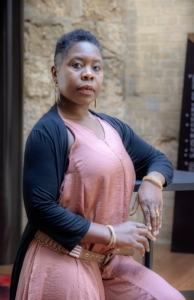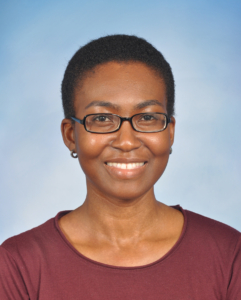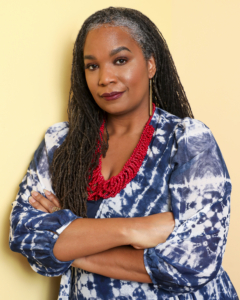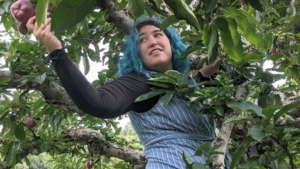As we mentioned last month: The Otherwise Award had a hiatus a few years ago, then restarted last year. So we didn’t convene juries to celebrate works published in 2022 and 2023.
We don’t currently plan to give out Otherwise Awards for those years, but we would still like to spotlight gender-expanding genre fiction you may appreciate, and to encourage and celebrate people who created noteworthy work.
So, to help with this, we’ve invited some friends of Otherwise to recommend genre work they loved from those years. We are sharing those recommendations in a series of blog posts. The first was in August, and here’s the next batch!
2022: Squire by Nadia Shammas and Sara Alfageeh
I first encountered Squire by Nadia Shammas and Sara Alfageeh while planning for my undergraduate course ENG 2310: Contemporary Fantasy of Color at Ohio University (it ran in Spring 2024). The course is framed by Nnedi Okorafor’s essay “Organic Fantasy,” which argues that the genre of fantasy has often privileged a very narrow set of identities, worlds, cultures, and experiences. Therefore, my class would explore a range of fantasy literature, film, scholarship, even everyday practices to address the ways writers, artists, and academics of color have reimagined, repurposed, and reclaimed the genre in order to explore the realities of race, gender, sexuality, ability, and other identities and embodiments. Squire proved to be both a pleasure and a surprise. It is a YA graphic novel set in an alternate history Middle East and tells the story of Aiza, a young woman training to become a Knight of the Bayt-Sajji Empire. Aiza dreams of becoming a hero, like the tales of old, and more importantly, a full citizen of the Empire; she must hide her status as a member of the Ornu people, who are oppressed and treated as second-class members of society. The graphic novel plays with and rewrites the “privileged” tropes, ideals, and values of “traditional” fantasy–knights in shining armor, princesses in a castle, who gets to be the hero, what parts of the world are othered and villainized—much needed interventions by Shammas, a Palestinian American writer, and Alfageeh, a Jordanian American illustrator. Squire is thoughtfully written and beautifully illustrated, centering non-Western characters, identities, bodies, architectures, cultures, and histories. On the surface, the graphic novel offers interesting characters, sweeping vistas, and epic worldbuilding, but simmering just below the surface, its narrative questions and critiques gender norms, personhood, belonging, war, colonization, friendship, and family. For Aiza, it turns out, the fantasy and magic are much more than just a coming-of-age, rags-to-riches, squire to Knight, good versus evil story. (Recommendation by Edmond Y. Chang)
2023: Golden Cobra Challenge 2023 Winners
My shoutout for 2023 is the Golden Cobra Challenge and the winners and honorees for the year. The Golden Cobra Challenge is a “a friendly contest open to anyone interested in writing and playing freeform larp.” Freeform larps or live-action role-playing are often small, short, games that foreground character-driven narratives, player interaction, and personal or social situations with minimal rules, mechanics, props, or other structures. The Challenge grew out of Metatopia, a convention for gaming industry professionals (held annually in Morristown, New Jersey), and was created to encourage new, independent, unsung, and emerging designers to showcase their work. In fact, diversity, inclusivity, and intersectionality are goals of the challenge, and the games selected by a panel of peers often engage with and unpack race, gender, sexuality, class, ability, nature, technology, history, and futurity as well as form, genre, narrative, gameplay, and worldbuilding. Many of the games draw on fantasy, science fiction, horror, magical realism, alternative history, and other speculative genres; unlike traditional or mainstream gaming, many of the designers represent diverse backgrounds, identities, embodiments, communities, and places of origin. Highlights from the 2023 winners include At the Doll Café by Carly Kocurek, a game about dolls at a tea party, which won “Most Brilliant Commentary or Critique” for its existential examination of gender, self-image, bodies, and agency with questions like “Would anyone care about me, if I was no longer beautiful?” or “If no child loves me, do I matter at all?” or “Do I have free will?”; Benediction by Laura op de Beke, which earned “Game That Made Us Cry the Most,” and according to the jurors is about “a group of medieval nuns await the arrival of a holy man set to change all their lives. It’s an intensely focused, well-researched, and emotionally heavy game about women given the chance to be introspective about their roles, their God, their fears and their desire”; and even my little game–called The Secret Lives of Junk(kin) Drawers, which is about household spirits that collect, trade, and reminisce about items that humans seemingly have forgotten–subtlety explores domesticity, kitchens, home, family, and the low-key fetishization and/or vituperation of Japanese professional organizer Marie Kondo; the game earned an Honorable Mention for being a “cute, prosocial game.” Each year offers up different ideas, problems, issues, solutions, and hopes. All of the games are open access. The Golden Cobra Challenge exemplifies the critical potential and inclusive generosity of indie games. (Recommendation by Edmond Y. Chang)
2022: The Unbalancing by R.B. Lemberg
As much as I would love to discuss my own debut which released in 2022 and involves explorations of gender-affirming care in a transnormative secondary world, I’d be remiss not to point to someone else also published by Tachyon that year: R.B. Lemberg and their debut novel The Unbalancing. Set in their Birdverse, The Unbalancing expands on a poem Lemberg published in Strange Horizons, “Ranra’s Unbalancing” (read after the book unless you want spoilers!), exploring the relationship between a nonbinary, autistic poet (whose understanding of their own gender changes throughout the novel) and their community’s new starkeeper (who literally keeps the stars in balance), all while facing the reality of an impending apocalypse. The Unbalancing is a gentle book; as one character is actively exploring their gender, we glimpse another corner in Lemberg’s multiplicitous Birdverse, one where queerness is embraced rather than ostracized (as in The Four Profound Weaves), and one where each character’s understanding of themself ultimately triumphs over what others would seek to make of them. (Recommendation by Naseem Jamnia)
2022: Mage of Fools by Eugen Bacon
“The bones of the ancestors pop with metamorphic hymns of water that is ruler and land that is slave, as people degenerate into crustaceans.” Eugen Bacon’s Mage of Fools is an extraordinary Afrofuturistic dystopian novel that—as multi-award-winning author Jeffrey Ford puts it—is “a techno/folklore blend with a resourceful mother at its heart.” The writing is bold and poetic, lush and vivid in its characterizations and themes of climate change, socialism, free will and the spirit of humanity in the face of atrocity. In the dystopian world of Mafinga (a made-up country borrowed from the East African Republic of Tanzania), our protagonist Jasmin must contend with a dictator’s sorcerer to cleanse the socialist state of its deadly pollution. The novel heroes strong women and the power of storytelling. It’s about hopes and dreams, country, liberty and belonging, as a secret story machine tells of fate, love and promise, charted by bold authors and their indelible scripts. (Recommendation by Eugen Bacon)
2023: “The Way of Baa’gh” by Cheryl S. Ntumy, in Mothersound: The Sauútiverse Anthology
“Red is a sign of decay.” Cheryl S. Ntumy’s “The Way of Baa’gh” has one of the most impactful opening lines. This science fiction / dark fantasy short story, in first person and characterized from the perspective of a nonhumanoid, is set in the Afrocentric Sauútiverse—a federation of planets that draws from real-life languages, cultural practices, rituals and beliefs, settling on the power of rich and complex sound magic as the pivot for cross-genre storytelling. Ntumy draws from the uniqueness of the Sauútiverse use of song and sound magic to engage with difference in themes of imprisonment and sacrifice for a bigger cause. We encounter our protagonist SS’ku in the ceremony of Tor-Tor where ritualistic cannibalism happens in a cycle of living. (Recommendation by Eugen Bacon)
More recommendations to come!








